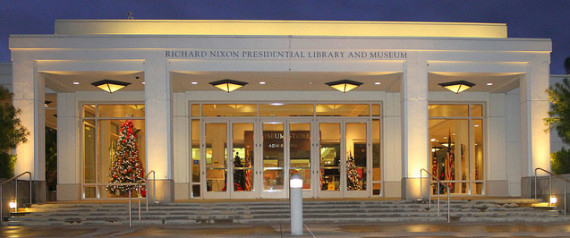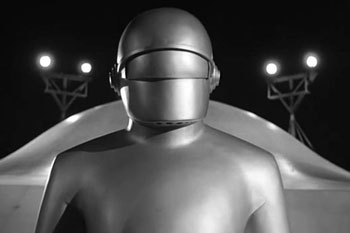
LOS ANGELES -- History is being restored at the Richard Nixon Library, where the Watergate exhibit once told visitors nearly four decades after the scandal led to his resignation that it was really a "coup" by his rivals.
For years the library exhibit that retraces the former president's notorious saga was a target of ridicule, panned for omissions and editing that academics and critics said shaped a legacy favorable to the tainted 37th president.
On Thursday, archivists will present a revamped and expanded version of the exhibit at the Yorba, Calif., library, a $500,000 makeover they say is faithful to fact, balanced and devoid of political judgment.
"What we tried to do is lay out the record and encourage visitors to come in ... and draw their own conclusions," said Susan Cooper, a spokeswoman for the National Archives.
Some material has never before been on public display, and it includes interviews with, among others, Watergate burglar G. Gordon Liddy and Nixon special counsel Charles Colson, who went to prison for seven months in 1975 for crimes related to the Watergate.
The exhibit opening marks a milestone for the library, whose tangled history is marked by uneasy relations between Nixon loyalists and the National Archives, which took over the site in 2007 and oversees the presidential library system.
When the library opened in private hands in 1990, Nixon biographer Stephen E. Ambrose wrote that commentary heard on one heavily edited Watergate tape "would almost convince a listener that Nixon never ordered a cover-up or a payment of hush money." The private Richard Nixon Foundation, which ran the site at the time, makes clear on its website the exhibit was "President Nixon's perspective" of the scandal that brought down his presidency.
Nixon White House aide Bruce Herschensohn believes that Nixon's perspective should have remained, saying presidential libraries should be a "shrine."
"I can only come to the conclusion it will probably be a hit piece," he said. "This is the Nixon library. This is his place. He's buried there ... and so is Mrs. Nixon."
He said the library has veered from archival work into politically charged interpretation since going under federal control in 2007
The Watergate scandal began with a burglary at Democratic National Committee headquarters at the Watergate Hotel complex in Washington, which eventually led to evidence of widespread wrongdoing in the Nixon White House and the president's resignation on Aug. 8, 1974.
The Nixon library, built with private money, was for years the only presidential library not part of the National Archives. That was because of a post-Watergate law mandating that Nixon's presidential records remain in the Washington, D.C., area. Lawmakers were afraid he would destroy documents necessary for the Watergate investigation.
The prohibition was eventually lifted by legislation pushed by California Republicans eager to incorporate the Nixon library into the national system.
Since the federal takeover, the foundation serves an advisory role. Last year it filed lengthy objections to the new exhibit, saying it lacked context to explain Nixon's decision-making.
Dismantled several years ago, the library's original Watergate exhibit was the largest of any at the site at the time, and the foundation stresses that no one found a factual error in its text or exhibits. Visitors followed documents, text and photographs arrayed along a long, darkened hallway.
Critics said it all amounted to a whitewash. "The presentation makes the best possible case for Nixon, mainly in Nixon's own words, and is entirely self-serving," Ambrose, the historian, wrote in a Los Angeles Times column.
Presidential libraries often tend toward veneration, but there is no other president forced from office during his term. At President Bill Clinton's library, opened in 2004, visitors pass along hardwood floors through an open-air exhibit, and a timeline in the center marks Clinton's time in office. An alcove exhibit off the timeline addresses the former president's impeachment and acquittal over the Monica Lewinsky affair.
The Archives' holdings from the Nixon presidency included more than 40 million pages of records, 4,000 hours of tape, 350,000 photographs and 2.2 million feet of film. A precondition for the exchange was that the Watergate exhibit be revised.
At one point, the American Library Association and 16 historians asked Congress to suspend the transfer of Nixon records for fear the library could limit public access to the materials and jeopardize their preservation.
Steve Frank, who worked on Nixon's 1968 presidential campaign in California, looks fondly on Nixon's presidency but welcomes a new, fuller treatment of Watergate at the library.
"I thought it was improper for them not to provide the whole substance of Watergate" in the original exhibit, said Frank, a conservative activist. "When you try to hide the facts, it makes it look worse than it is."


